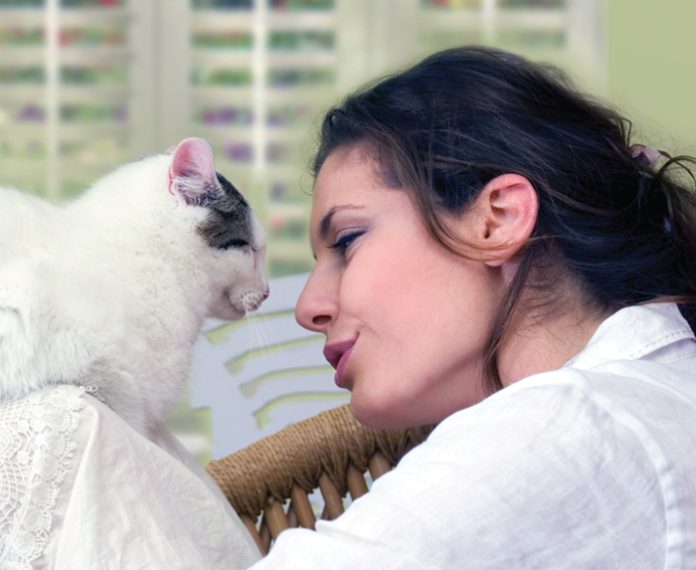Most cat lovers don’t mind that cat breath isn’t always minty-fresh. When your cat’s breath gets so bad that it makes you want to gag, though, it’s time to head to the veterinarian to figure out the cause of the stink.
Dental Woes
“Periodontal disease is by far the most common cause of bad breath,” says Lindsey Schneider, DVM, Dentistry and Oral Surgery Resident at the Cornell University Hospital for Animals. Periodontal disease, also referred to as periodontitis, is infection of the gums and other tissues that support your cat’s teeth. It is very common, with the Cornell Feline Health Center citing that it can affect between 50 and 90% of cats over the age of four. Cats suffering from periodontal disease typically have inflamed gums that may also bleed easily, cause them to chew oddly or refuse certain foods, and have plaque and calculus (tartar) buildup on their teeth. As the disease progresses, the gums can recede, the teeth can become loose, and they may fall out.
Other problems in the mouth can cause bad breath in cats, too. Dr. Schneider says, “These include oral foreign material (i.e., something the cat chewed on), stomatitis (an inflammatory disease that affects between 1 and 2% of cats), oral tumors, and viral infections that cause oral ulcerations, such as calicivirus or herpesvirus.”
Depending on your cat’s personality, your veterinarian may be able to identify problems in the mouth during a routine appointment. To determine the extent of any problems or for uncooperative kitties, though, an oral exam and dental radiographs (x-rays) under sedation or anesthesia is often necessary.
Systemic Illness
“Metabolic causes of bad breath include kidney disease, diabetes, and GI issues,” says Dr. Schneider. Cats with kidney disease may have bad breath that smells like ammonia. A sweet smell to the breath can indicate diabetes, and the breath of a cat suffering from gastrointestinal disease or blockage may smell like vomit or even rotting food.
These conditions can occur on their own or in conjunction with periodontal disease (or with each other). So even if your cat’s teeth look like something out of a horror movie, it is a good idea to check for other problems while at the veterinary hospital for a dental cleaning.
History and Bloodwork
Identifying the cause of bad breath requires a knowledge of your cat’s history and behavior, the results of diagnostic tests, and your veterinarian’s ability to interpret these factors. Think about any new behaviors your cat has been exhibiting, such as chewing with his head tilted sideways, refusing food, drooling, acting depressed, and any overall changes in your cat’s health, including weight loss, the amount of water he drinks, the development of vomiting and/or diarrhea, and how much he is urinating. Write everything down, so you can stay organized during the visit with the veterinarian.
Bloodwork is an important part of regular veterinary care to monitor for developing problems. If your cat is being put under anesthesia for a dental cleaning or other procedure, your veterinary team will usually recommend preanesthetic blood work to make sure that her organs are functioning normally and that she will be able to clear the anesthesia from her body.
Dr. Schneider says that at Cornell, “A complete blood count and chemistry panel are required for all animals over seven years of age prior to a dental procedure, or any animals with other underlying medical conditions. Younger healthy animals receive quick assessment blood tests prior to dental procedures.”
Treatment
Exact treatment will vary depending on your veterinarian’s diagnosis, but a dental cleaning will often be part of the plan. Even if your cat’s teeth don’t look particularly bad, plaque and bacteria can build up under the gumline and wreak havoc. Periodontitis left untreated can progress to cause systemic health problems, so it is a good idea to get your cat’s teeth cleaned while he is a healthy adult so that he has a clean slate going into his senior years.
If your cat has a systemic illness such as diabetes or kidney disease, he may not be able to have a dental cleaning until he has been stabilized.
Help at Home
If your cat only has occasional bad breath or you are waiting for an appointment, there are some things you can try at home. Dr. Schneider advises, “The best way to alleviate bad breath is routine oral home care with daily toothbrushing. In addition to minimizing halitosis, this will also help slow the progression of periodontal disease. Numerous other dental hygiene products are available to help reduce plaque and calculus (including diets, water additives, oral sprays, and treats). I typically refer clients to the Veterinary Oral Health Council website, vohc.org, for a list of products that have earned the organization’s seal of acceptance, which indicates that the product has undergone clinical testing to show that it meets pre-set standards for retarding the development of plaque and tartar.” For video instructions on how to brush a cat’s teeth, visit the Cornell Feline Health Center’s website http://tiny.cc/CWbrushteeth.




